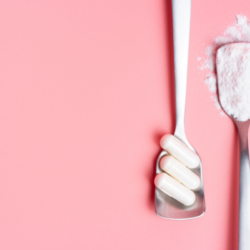Lactose is the main carbohydrate in milk. In infants, it provides an important part of energy. In adulthood, it is mainly provided by milk and dairy products.
To be digested, lactose must be hydrolyzed by an enzyme, lactase, but some individuals are deficient in lactase in adulthood. This genetically programmed deficit in a large part of the world’s population is often the cause of malabsorption. When malabsorption results in bothersome problems demonstrated by appropriate tests, it is called lactose intolerance.
How to diagnose lactose intolerance?
The diagnosis of intolerance is made in a hospital setting. Self-diagnosis is not enough. Many people with functional digestive disorders have normal lactase activity, but complain of milk intolerance. These are probably problems of digestive hypersensitivity to fermentation or psychological effects. For example, consuming a white lactose-free product can induce digestive symptoms.
The self-diagnosis is therefore not sufficient to conclude that there is intolerance. People’s subjective opinions about their possible intolerance turn out to be false in more than half of the cases.
In order to prove that clinical symptoms are associated with poor lactose digestion, it is necessary to perform a hydrogen expiration test. The higher the level of hydrogen exhaled after ingestion of lactose, the less efficient the digestion of it.
Should we ban lactose from our diet?
The consumption of dairy products is not to be banned in cases of intolerance, on the contrary, it is better to favor it so as not to expose yourself to deficiencies.
Most people with lactose intolerance can consume up to 12 g of lactose (the equivalent of 1/4 of a liter of milk) without any symptoms. In addition, mature cheeses and yogurts can be consumed. Cheeses like Camembert, Brie, Livarot, Gruyère, etc. contain only traces of lactose.
Maintaining lactose in the diet is possible at the cost of a few simple dietary advice in the majority of intolerant subjects in order to avoid under-consumption of calcium and thus expose themselves to an increased risk of bone disorders, in particular of osteoporosis.
Enzyme supplements should be an adjunct and not a substitute for food restriction. The lactose intolerant person should take calcium supplements (1200 to 1500 mg / day).
The lactic ferments in yogurt synthesize a lactase which allows them to hydrolyze lactose and to be nourished by this sugar. Bacterial lactase is inactive in yogurt but becomes active in the intestine when the lactic ferments get there, especially in the duodenum where the physicochemical conditions approach optimal conditions for the functioning of the enzyme.
Some dietary advice to better cope with your intolerance on a daily basis:
Lactose is mostly found in unfermented dairy products, so it is not necessary to eliminate all dairy products from your diet.
- Take food supplements:
- Lero lactease
- Enzycalm
- Consume foods or products containing lactose in small amounts only and at the same time as other foods (fruits, vegetables, meats, fish, etc.)
- Avoid eating this type of food or product too quickly
- Prefer whole milk to skimmed milk
- Distribute daily dairy products over the three main meals
- No dairy product on an empty stomach, but always during meals, because the fibers, proteins and fats provided by other foods slow down gastric emptying







